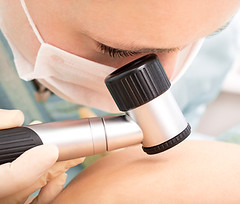
Welcome to the Harrogate Skin Cancer Support Pack
Whether you have had a skin cancer diagnosis, been told you have a higher risk of skin cancer or are just looking for more information, this page has been designed by the Skin Cancer Clinical Nurse Specialist Team to enable you to access all the information you need, when you need it.
In partnership with:
Skin Cancer
Types of Skin Cancer
Who's at risk?
Click the images to find out more.
Sun Safety & Sun Burn
What to do if you're worried.

Your Skin Cancer Nurse Specialist will be happy for you to ring for advice but they may well advise you to see a Doctor.
The easiest and quickest way to do this is usually to see your GP. They can see and examine the area and may be able to reassure you, without you needing to come to the hospital
Many changes turn out to be totally harmless, you’re just far more aware of your skin after a diagnosis of skin cancer.
If the problem is with a skin cancer you are already having treatment for however we will usually arrange for your consultant to see you
Remember – If in doubt, check it out.
How to check your skin
If you have a lot of moles it can be harder to check so:
-
Get to know your skin and what is normal for you, we’re all different
-
Look for changes.
-
Look for the ugly duckling, the one that is different from the rest
-
Check once a month, changes can happen at any time, see the video for how to do this.
-
Take photographs to compare against.
-
Put a ruler next to the mole you want to keep an eye on so you can see if it gets bigger.
-
Use an app to store them, this is an example of one which lets you put the images next to each other and makes it easier to compare, but you may find one you like better.
Remember – If in doubt, check it out
©2020, WebMD, LLC. All rights reserved
Regular checking of your skin is simple but important. Watch the video to find out more.
Video credit: WebMD
The information on this page is for guide use only. If you are unsure about anything or have concerns about your health, please speak to a trained health professional.


























